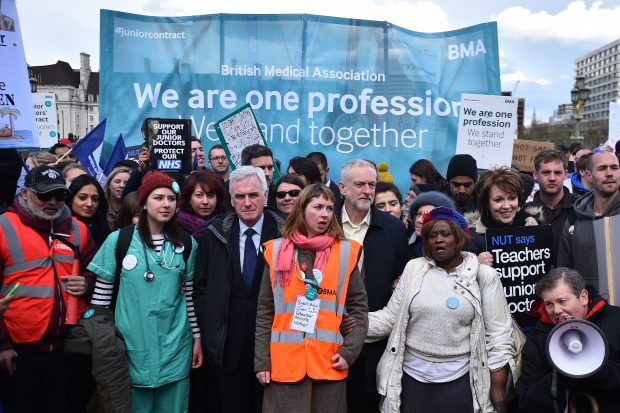The BMA’s decision to cancel the first of its planned five-day strikes yesterday was justified as a response to concerns over patient safety. Yet these warnings were nothing new. The General Medical Council issued frank advice to doctors hours earlier saying the strikes could harm patients. And the former Department of Health director Sir John Oldham – who also wrote Labour’s health policy review two years ago – also said the strikes were unethical. These interventions followed last week’s statement from the Academy of Royal Medical Colleges that, wait for it, made it clear the strikes would cause ‘real problems’ for the NHS. But amidst those warnings, Labour’s silence on patient safety was deafening.
In an interview last weekend, Labour’s shadow secretary of state for health, Diane Abbott, made it clear that, should the strikes go ahead, she would be on the picket line. This perhaps isn’t surprising. In April, Jeremy Corbyn and his shadow chancellor John McDonnell soberly marched on Whitehall shoulder-to-shoulder with junior doctors. Seasoned McDonnell watchers may also recall his role in the departure of Abbott’s more moderate predecessor as shadow secretary of state for health, Heidi Alexander. Operating just a touch outside of the traditional responsibilities of the shadow chancellor, McDonnell undermined Alexander by seeking to create a health advisory group consisting of members of the independent umbrella organisation Health Campaigns Together.
Health Campaigns Together is dedicated to fighting the privatisation of the NHS, and supported by organisations including Momentum and the Socialist Health Association. From minutes on the Health Campaigns Together website, a number of familiar names – who also appear to be members of the BMA Council – pop up as proposed representatives for the McDonnell advisory group. The BMA Council was, of course, reportedly split 16-14 in its vote on the new round of strike action.
The minutes also make plain that one of the priorities of Health Campaigns Together in advising McDonnell was to promote the NHS Bill – a piece of privately drafted legislation, totemic among certain health campaigners, that seeks to reverse the privatisation of the NHS. Happily, when the NHS Bill was presented to Parliament in July by Labour MP Margaret Greenwood, Diane Abbott was on hand to grab the nearest megaphone and address a rally outside Parliament to show her support.
The NHS is facing the greatest financial challenge in its history as a result of a flat funding settlement, an ageing population, more expensive treatments, and increasing patient expectations. The independent and well-respected health think tank The King’s Fund noted last year that there has been no wholesale privatisation of the NHS. Ignoring that inconvenient fact, senior Labour figures have indulged individuals and campaigns drowning in magical thinking about the NHS. In doing so, they have weakened the position of moderate doctors, both inside and outside of the BMA. Corbyn’s Labour can be added to the rather long list of those culpable for the mess junior doctors find themselves in.
Tim Connolly is a freelance writer specialising in politics






Comments